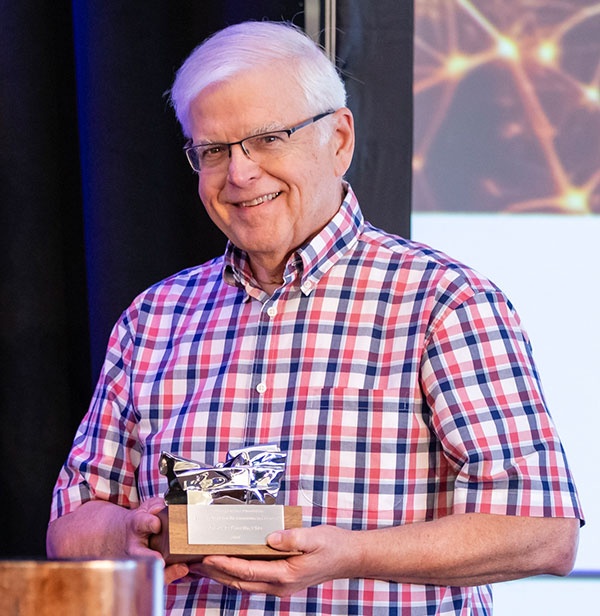The Huntington’s Disease Foundation is thrilled to announce the recipient of the 2024 Leslie Gehry Prize for Innovation in Science. Congratulations to James F. Gusella, PhD, from Harvard Medical School/Massachusetts General Hospital and the Broad Institute of MIT and Harvard.

Dr. Gusella receiving the Gehry Prize, Boston, August 2024
Few people have changed the research landscape of a disease field as much as Dr. Gusella. His work has made possible some of the most critical findings in Huntington’s disease (HD) research – the discovery of the gene that causes HD, the development of a test for the gene, the creation of countless animal models, and the discovery of genes that modify age of disease onset. His accomplishments within the field are so deep and meaningful that one would be hard pressed to find a single peer-reviewed scientific paper on HD that doesn’t cite his work.
As a young postdoc in 1983 in the lab of the first Gehry Prize recipient, Dr. David Housman, Dr. Gusella was a key member of the team that mapped the genetic marker for HD to chromosome 4. This discovery directly led to the development of a genetic test for the disease and then, a decade later, to the identification of the gene that causes HD. Having the gene in hand enabled the creation of animal models of HD that have been used to study the molecular complexities of the disorder. Dr. Gusella went on to build his career in HD research, working to understand the cause behind and mysteries of Huntington’s.
He is a senior member of the Genetic Modifiers of Huntington’s Disease (GeM-HD) Consortium. In 2015, led by Dr. Gusella, GeM-HD published a landmark paper with only this moniker, something rare in an industry where author lists are long and the order influences decisions for promotions and tenure (similar to authorship of the paper when the HD gene was identified by “The Huntington’s Disease Collaborative Research Group”). Collecting samples from over 4,000 individuals from families affected by HD, the consortium detailed some of the most notable findings in HD history. Their work identified “modifiers” – genes that modify how early or late someone begins to show symptoms. Modifiers identified in this paper are now targets in upcoming clinical trials.
The GeM-HD Consortium has continued its efforts to define and understand HD. This past summer they published a preprint ahead of peer-review to detail findings of modifiers that are specific for different cell types of the brain. These efforts could help understand how the pathogenic process affects different cell types of the brain in specific ways.
Dr. Gusella was presented with the 2024 Leslie Gehry Prize at HDF’s recent HD2024: Milton Wexler Symposium, where he offered a few remarks: “My first HDF meeting was a free-association workshop about 45 years ago run by Milton Wexler, and it got me into the HD field. I went to that meeting because [HDF President] Nancy Wexler and David Housman had convinced me coming out of graduate school to take on the task of finding the chromosomal location of the HD gene. I had the firm belief then, and continuing now, that the knowledge necessary to treat HD lay in the HD patients themselves, and that one had to capture that. Genetics was the way to do it. I’m very hopeful that I will see a treatment for HD before I retire.”
The Leslie Gehry Prize for Innovation in Science was created as a collaboration between HDF and HDF Founding Director and renowned architect Frank Gehry and his family to honor his late daughter Leslie’s memory. This prize recognizes scientists who have made extraordinary contributions to the field of HD research. Leslie celebrated life with joy and this prize reflects Leslie’s many talents and gifts – originality, spontaneity, precision, and rigor – all critical attributes in a scientist.
Truly, Dr. Gusella embodies the qualities of the Leslie Gehry Prize for Innovation in Science, using inventiveness and imagination to shift paradigms and lead to new advances in seeking a cure for HD. We are so grateful to the Gehry family for their longstanding support of the Huntington’s Disease Foundation through this exceptional award mechanism.
